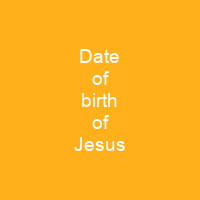The date of birth of Jesus is not stated in the gospels or in any historical reference, but most theologians assume a year of birth between 6 and 4 BC. The day or season has been estimated by various methods, including the description of shepherds watching over their sheep. Neither the Gospel of Luke nor Gospel of Matthew mention a season for Jesus’ birth.
About Date of birth of Jesus in brief

The Roman festival of Natalis Solis Invicti has also been suggested, since it was associated with some prominent emperors and was celebrated with a public banquet. It is likely that such a feast was chosen for Christ’s contrast and triumph over paganism. Alternately, it may have been selected due to Christian converts rebuked to introduce pagan elements into the Christian celebrations due to the Christianization of the Roman religion. The date of Christ’s birth is not mentioned in the New Testament gospels of Matthew and Luke. Some scholars challenge a winter birth for Jesus and some defend the idea by citing the mildness of winters in ancient Israel and rabbinic rules regarding sheep near Bethlehem.
You want to know more about Date of birth of Jesus?
This page is based on the article Date of birth of Jesus published in Wikipedia (as of Dec. 24, 2020) and was automatically summarized using artificial intelligence.







